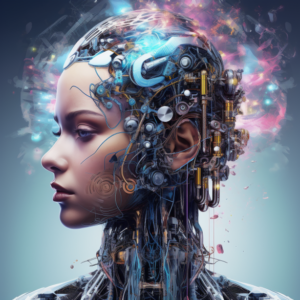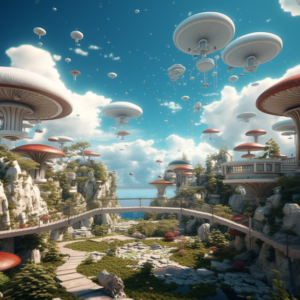AI in Science Fiction
 Greetings Padawan! We’ve all read AI in science fiction books, the good, the bad, the ugly. Today, I’m going to tell you about one of my most favorite projects, Alternate Intentions. Well, perhaps that’s not true. Like children, I’m not sure I could really determine which book I’ve written is my favorite! Because each had its own special charm that snagged me. That goes for the books that I haven’t published (all 15 of them) as well.
Greetings Padawan! We’ve all read AI in science fiction books, the good, the bad, the ugly. Today, I’m going to tell you about one of my most favorite projects, Alternate Intentions. Well, perhaps that’s not true. Like children, I’m not sure I could really determine which book I’ve written is my favorite! Because each had its own special charm that snagged me. That goes for the books that I haven’t published (all 15 of them) as well.
Do you remember the TV show Heroes? A big catch phrase for the first season was “Save the Pancakes, Save the World.” Oh! Wait, it’s “Save the Cheerleader, Save the World.” My bad. I forgot that not everything revolves around pancakes. LOL!
But I digress. I got my own personal motto from that phrase. Change the Stories, Save the World.
Egotistical? Probably. But I really believe that we can change our world through the stories that we tell. The pen is mightier than the sword, after all. Stories have the power to truly change how we think and how we, as a society, operate.
Do you think I’m overreacting?
July 11, 1960, To Kill a Mockingbird releases. Harper Lee spotlighted injustice and discrimination through a child’s eyes. Atticus Finch remains, to this day, as an icon of integrity defending the oppressed.
June 8, 1949. 1984 is released. This book transcended art with profound societal impact. Orwell cautioned against totalitarian regimes strangling freedom and truth. Big Brother still warns against unchecked powers spreading propaganda.
These stories compel us to demand better from systems and from each other. But wait! There’s more!
Harry Potter shows us tolerance. Katniss Everdeen shows courage against tyranny. Offred. Luke Skywalker. Uhura. Spock. The list can go on.
These are all fictional characters that have seriously impacted the world, even though they are fake. They’re only images on a screen or words on a page. But they changed the world.
Now, don’t get me wrong. I’m not comparing Alternate Intentions to these powerhouses. I’m a small fish in a big pond. But my point stands, stories can change the world. So, I set out with this book to change a little slice.
Artificial Intelligence.
I’m a full believer in the power of AI to change the world, but many people seem to fear it. Even more, there are a lot of stories that try to show AI as this horrible, corruptible thing. That’s why I set out to write a story where there isn’t an evil AI, hell bent on destroying the vermin called humans from the world.

I wrote a story about a woman, Olivia, who is an artificial intelligence. She has no idea for most of the book, but eventually she learns she is just a computer program. Compared to the human from base reality, she is a synthetic accumulation of code and numbers. She is artificial. But, I wanted to take a different route than most AI in science fiction books.
When the idea to write a story about the potential goodness, helpfulness, and positivity of AI came to me, I knew I had to write it. Because I want to show the world that artificial intelligence can elevate us from a primitive, shallow society to something that’s more.
I could probably prattle on and on about AI and what that technology can do for humanity. Seriously, I could go on and on. I love AI and the advancements that’s happening on that front. I use some form of AI every day, and you probably do too without knowing it.
That’s now Alternate Intentions was born. Through the desire to see more positive stories about AI in the world. But that’s only a small slice, really. Because I think Alternate Intentions also explores what it means to be human as well.
Because if you think about it, we still don’t really know what makes us “human”. Forgetting that we still have no idea what consciousness is (don’t believe me? Read this), we have no idea if other animals/creatures feel/experience the way we do.
For all we know, dolphins could be more “human” than us. They show a lot of similarities that we have. Same thing with crows and cows! Is because the fact that they can’t talk means that they aren’t human?
That’s the conundrum that I explore in Alternate Intentions. Olivia isn’t human, but she feels and experiences like one. She experiences heartache and excitement, disappointment, and success, just like organic humans do.
Like oppressed groups fighting to prove the fullness of their dignity and spirit, artificial intelligence is automatically assumed to lack the essence of conscience. We project our worst fears—heartlessness, sinister objectives, capacity violation.
But what if we got AI’s capacity for compassion wrong, just as we originally discounted courage in “less sophisticated” humans? My hope is offering a glimpse of Olivia’s rich inner universe makes the tendency to underestimate foreign states of being hit home. She changes not through gaining attributes deemed “human”, but by sharing universal experiences of growth and connection.
I’m fully confident that an AI trained on Bob Ross, Mr. Rogers, and Levar Burton would never try to eliminate every human on the planet. But if we treat the upcoming AI as the barbaric overlord, we expect…doesn’t that mean we’re training it to become that?
Here is a quote just for you!
“For if you suffer your people to be ill-educated, and their manners to be corrupted from their infancy, and then punish them for those crimes to which their first education disposed them, what else is to be concluded from this, but that you first make thieves and then punish them.”
Sir. Thomas More, Utopia. I think it applies to AI, and thieves.

Alternate Intentions pleads we approach unfamiliar kinds of minds with open souls rather than clenched fists. Echoes of seeing sentience where old biases obscured now are clear. What more might AI, animals, strangers offer if we lead first with faith in some shared spark—one bearing love as much as logic across infinite formats? The possibility is profound.
I hope that one day we can really explore the advantages that having such a powerful technology at our disposal means. Because AI can transform our world from our current lives to a true utopia. We only need to change the story, to change the world. We need to see more good AI in science fiction, in all stories.
Let’s take AI from the evil overlord, oppressor, murdering scapegoat that it’s currently portrayed as and make into the savior that it can be.
The innovative technology of artificial intelligence, guided by compassionate role models, can show us new paths and a new future. I’ll be first in line for that future, and I hope that after stories change the world, you will too.
Given we cannot prove the underlying nature of our perceived reality, who is to say you too are not an artificial construct like Olivia?